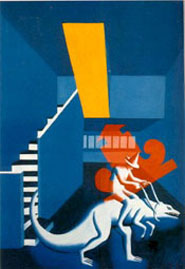
馬克斯(Karl Marx)
作品: |
|
|
| -- 更分殊地檢討經濟結構和上層結構的關係
-- 檢查文化文本的製造和生產關係、商品化過程、消費行為 |
-- "If the base is the cause of the superstructure, it cannot be dependent on it. [But capitalism depends on the legal system.] (以後會討論到:mediation, circuit, network) -- Schmitt's interpretation: |
Morality, religion, metaphysics, all the rest of ideology and their
corresponding forms of consciousness, thus no longer retain the semblance
of independence. They have no history, no development, but men, developing
their material production and their material intercourse, alter, along
with this their real existence, their thinking and the products of their
thinking. Life is not determined by consciousness, but consciousness
by life (Tucker 153-54)
. . . each new class which puts itself in the place of one ruling before
it, is compelled , . . ., to represent its interest as the common
interest of all the members of society.
1. One must separate the ideas of those ruling for empirical reasons, under empirical conditions and as empirical individuals, from these actual rulers, and thus recognise the rule of ideas or illusions in history. |
|
| The totality of these relations of production constitutes the economic structure of society, the real foundation on which there arise a legal and political superstructure and to which there correspond definite forms of social consciousness. . . . It is not the consciousness of men that determines their being, but, on the contrary, their social being that determines their consciousness. (198) |
| [economic factor as the ultimate factor]
--the ultimately determining element in history is the production and reproduction of real life. . . . [but not] the only determining one. . . . There is an interaction of all these elements in which, amid all the endless number of accidents . . . the economic movement is finally bound to assert itself. -- We make our history ourselves, but first of all, under very definite assumptions and conditions. -- . . . history is made in such a way that the final result always arises from conflicts between individual wills, of which each in turn has been made what it is by a variety of particular conditions of life. (199) -- [confirms the values of individual wills] . . . from the fact that the wills of individuals--each of whom desire what he is impelled to by his physical constitution and external, in the final analysis economic, circumstances. . . do not believe what they want, but are merged into an aggregate mean, common resultant, it must not be concluded that their value is equal to zero. (200) |
| -- 資本的累積來自於Wage
Labor的價錢和所生產的商品價錢的不同﹐也就是剩餘價值(surplus
value.)這些剩餘價值可以供資本家購買更多原料或wage labor.
Labour power is . . . a commodity which its possessor, the wage worker, sells to capital. (Tucker 204) Labour power was not always a commodity. Labour was not always wage labour, that is, free labour. The slave did not sell his labour to the slave owner. . . (Tucker 205) Capital consists of raw materials, instruments of labour and means of subsistence of all kinds, which are utilixed in order to produce new raw materials, new instruments of labour and new means of subsistence. All these component parts of labour are creations of labour, products of labour, accumulated labour. Accumulated labour which serves as a means of new production is capital. (Tucker 207) Capital does not consist in accumulated labour serving living labour as a means for new production. It consists in living labour serving accumulated labour as a means of maintaining and multiplying the exchange value of the latter. |
Fetishism
"Whence, ... arises the enigmatic character of the product of labor, so soon as it assumes the form of commodities? Clearly from this form itself. . . . finally, the mutual relations of the producers, within which the social character of their labor affirms itself, take the form of a social relation between the products. |